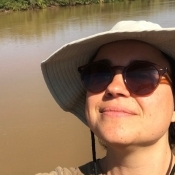Protecting primates from deforestation and illegal hunting in Guinea-Bissau
Considered a priority area in West Africa for the conservation of the Western chimpanzee, Guinea-Bissau is a regional refuge for primates. For the last decade, however, habitat destruction and illegal hunting became powerful forces driving the decline of Guinea-Bissau biodiversity and, in particular, of primate species. Logging and mining companies have destroyed large areas of habitat, which exacerbated illegal hunting for primate bushmeat, trade of infant chimpanzees and primate body parts used in traditional medicine. Entire groups have disappeared already and the last remaining populations are becoming increasingly isolated and highly vulnerable to extinction. Despite this conservation emergency, governmental agencies and national conservation NGOs are incapable of coordinating efforts. The location of the last remaining populations is unknown and a systematic method to define and prioritize the most important areas for conservation is lacking. This project aims at developing a long-term, sustainable, country-scale conservation management strategy within a collaborative working group dedicated to primate conservation. Our goals are: 1) to protect the Western chimpanzee and other primate species and forest-dwelling animals from hunting and deforestation in Guinea-Bissau and 2) to engage local communities, government agencies and local stakeholders in the protection of primates in the country. We will survey the current distribution of chimpanzee populations and of other primates and evaluate their conservation status using a combination of genetic and spatial analytical tools and modelling. Populations most vulnerable to extinction (e.g. isolated and displaying low levels of genetic diversity) and areas critical for the long-term conservation of primates (e.g. natural ecological corridors used by multiple species) will be identified. In collaboration with governmental agencies and key NGOs, the areas where conservation resources are better allocated will be selected. By working with local media experts, we will identify the best practices and communication strategies and develop a series of public awareness‐raising products and activities, including the production of one song that will be disseminated in Guinea-Bissau and neighbouring countries. We expect that our contribution to primate conservation in Guinea-Bissau will have a long-lasting impact.
Team
Principal Investigator

Maria Joana Ferreira da Silva
Position: Associate Researcher
Group:
BIODESERTS State
Concluded
Proponent Institution
ICETA-UP (CIBIO-InBIO)
Funded by
Primate Conservation Incorporated
Dates
2017 (Duration: 1 year)
Participant Institutions
Parc National de Diawling; Green Sahel Expertise
Reference
PCI# 1400